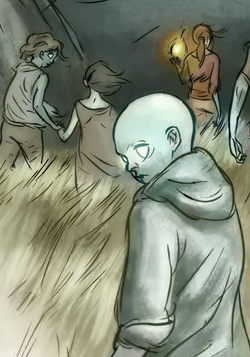Colleague Michael Magoolaghan passed along a link to the transcript of Tim Berners-Lee’s testimony before Congress.
Hearing on the “Digital Future of the United States: Part I — The Future of the World Wide Web”
It’s fascinating reading, and extremely quotable. But one part that really struck me is in the first paragraphs (emphasis added):
To introduce myself, I should mention that I studied Physics at Oxford, but on graduating discovered the new world of microprocessors and joined the electronics and computer science industry for several years. In 1980, I worked on a contract at CERN, the European Particle Physics Laboratory, and wrote for my own benefit a simple program for tracking the various parts of the project using linked note cards. In 1984 I returned to CERN for ten years, during which time I found the need for a universal information system, and developed the World Wide Web as a side project in 1990.
While TBL didn’t invent the Internet entirely, his bit of brilliance made it relevant for the masses. Even though that wasn’t his intention right off the bat, it became so as he realized the implications of what he’d done.
But let’s look at the three bits in bold:
- He started studying Physics, then decided to follow a side interest in microprocessors.
- He created an e-notecard system for himself, on the side of (and to help with) what he was contracted to do at CERN.
- He developed a universal version of his notecard system so everyone could share and link together, as a side project in 1990.
Imagine the world impact of those three “side projects”?
This really begs the question for any organization. Does it give its members the leeway for “side” interests? Are they considered inefficient, or just odd?
It’s not that every person is going to invent another Web. It’s more that the few people who might do something like that get trampled before they get started, and that the slightly larger group of people who might do something merely impressive are trampled in the same way.
There was a time when amateurs were the experts — they were the ones who dabbled and learned and communicated in excited screeds and philosophical societies. They were “blessed” to have the time and money to do as they pleased, and the intellectual curiosity to dig in and dirty their hands with figuring out the world.
It could very well be that we’re in the midst of a similar rush of amateur dabbling. Just think of all the millionaires who are now figuring out things like AIDS, malaria and space flight. Or the empowerment people have to just go and remix and remake their worlds. There’s an excellent O’Reilly Conference keynote I wish I’d seen, but the pdf of the slides gives a decent accounting. Here’s an abstract:
Rules for Remixing; Rael Dornfest & Tim O’Reilly
Citizen engineers are throwing their warranties to the wind, hacking their TiVos, Xboxes, and home networks. Wily geeks are jacking Jetsons-like technology into their cars for music, movies, geolocation, and internet connectivity on the road. E-commerce and network service giants like Amazon, eBay, PayPal, and Google are decoupling, opening, and syndicating their services, then realizing and sharing the network effects. Professional musicians and weekend DJs are serving up custom mixes on the dance floor. Operating system and software application makers are tearing down the arbitrary walls they’ve built, turning the monolithic PC into a box of loosely coupled component parts and services. The massive IT infrastructure of the ’90s is giving way to what analyst Doc Searls calls “do-it-yourself IT.
We see all of this as a reflection of the same trend: the mass amateurization of technology, or, as Fast Company put it, “the amateur revolution.” And it’s these hacks, tweaks, re-combinations, and shaping of the future we’re exploring in this year’s Emerging Technology Conference theme: Remix.
I saw Mark Frauenfelder on Colbert Report last night, talking about Make Magazine and the very things mentioned in the abstract above. Colbert marveled at the ingenuity, and I wondered how many people watching would think to themselves: “Hey, yeah! Why not just take things apart and change them to the way I want them???”
It’s on the rise, isn’t it? Wow. Another sea change, and I’m not even 40. What a time to be alive.
All hail side projects and passionate tangents. Long may they reign.
But for now… I gotta get back to work.



